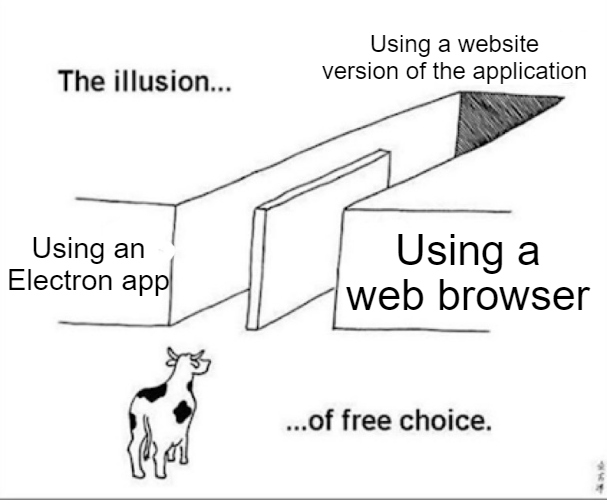this post was submitted on 11 Sep 2023
1168 points (97.1% liked)
Programmer Humor
33490 readers
223 users here now
Post funny things about programming here! (Or just rant about your favourite programming language.)
Rules:
- Posts must be relevant to programming, programmers, or computer science.
- No NSFW content.
- Jokes must be in good taste. No hate speech, bigotry, etc.
founded 5 years ago
MODERATORS
you are viewing a single comment's thread
view the rest of the comments
view the rest of the comments

Isn't this about performance and not storage?
Making and managing an electron app is easier, but it is possible (with more work) to have clean install/uninstall, a nice UI, and consistent regular updates while still being fast and efficient.
Better programs will always need more work to create.
I am curious about what other options there are, and why Electron is what a lot of people go with.
People choose Electron because they already know how to write Chromium apps (web dev). It's really just ease of development, using another framework takes more specialized skills than using Electron.
That's why everything is Chromium these days.
The root cause is one step deeper, tbh: Web apps are cheaper. You take BSc's and make them create web pages, and hey, with Chromium they can also be your desktop app devs. No need to have costly MSc's for backend or full-stack work.
I mean this might vary depending on where in the world you are, but web devs earn a fair bit less over here.
It's not really because the developers are cheaper, it's because the vast reduction in complexity is cheaper. Let's say you've got a great general app idea and you're going to build a startup. Your app is going to have to be mobile and desktop. To do that well, natively, this means:
In short, moving from one platform to two natively doesn't double complexity and cost, it's far, far worse than that. It's not that a good web dev costs $70k vs an iOS dev that makes $90k, it's that a good iOS dev costs $90k, and a good Android dev costs $85k, and a good Windows dev costs $80k and one of those people hopefully is familiar enough with each platform to be the team lead so you can tack on another $20k for them...
And all the while you're building that team and building your 3 different platform native apps, a competitor or several will launch on Electron and web tech and take the market because no one except us nerds give a shit about whether something is using the right platform idiom or even knows what they are, and far fewer still have any idea how to check RAM usage and the like.